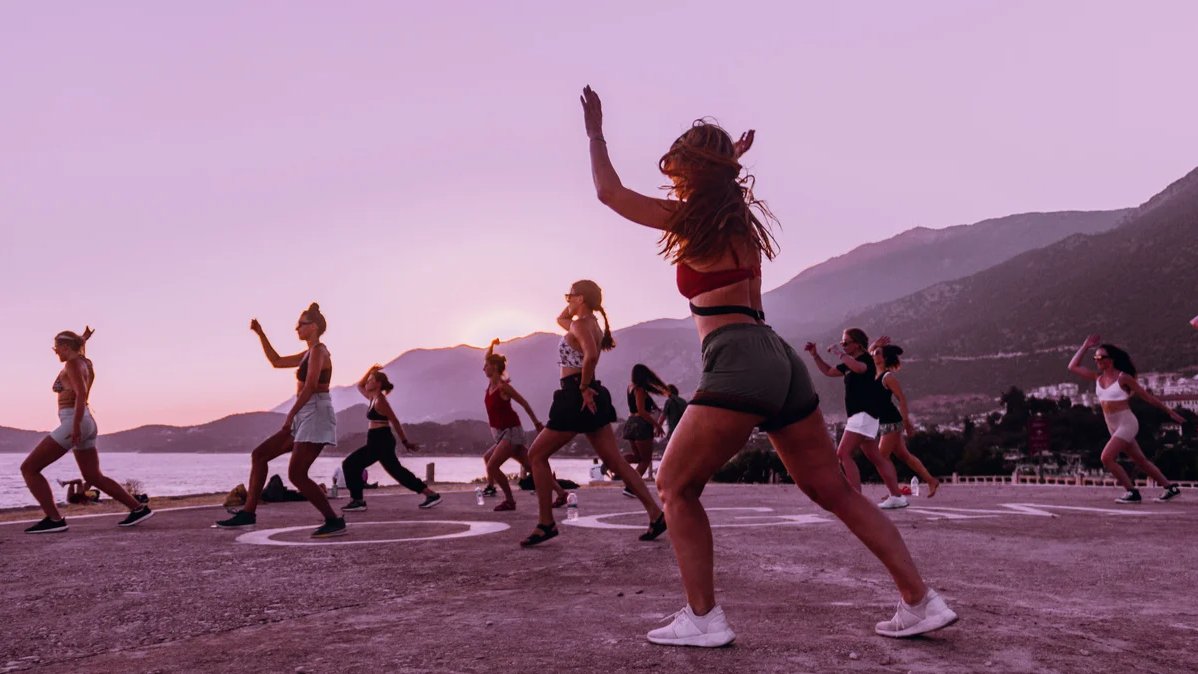This small town adorned by oleanders is in many ways similar to other resorts — just around 10,000 people live in so-called "small" Kas, while tourists increase this number several-fold in the holiday season. Russians enjoyed these beautiful places before but the number of arrivals spiked even more after 24 February. Now, every fifth or sixth resident of Kas is a Russian citizen.
Who are all these people? And how can you become one of them?
‘I remember the war in Georgia still’
Galina Yuzefovich, book reviewer and teacher, embarked on a flight to Turkey with her husband and younger son already at 12 p.m. on February 24.
“We emigrated so quickly due to a turn of unexpected events, while other unexpected events brought as here, to Kas. Our elder son was in Turkey at the time, he was at a rock-climbing training camp. He is a mountaineer and I have a very vivid imagination. I still remember the war in Georgia, I left the country on a plane where people were smoking and you could fly standing because there weren’t enough seats. And I could imagine it very well happening again. I thought that all borders would be shut then and our son would be separated from his parents. It would be better if we were on the same side of the border. Airbnb was still working then and we found a nice place in Kas. A friend of mine lives here (now there are many more of them here, while at the time she was the only one as she had come here for the winter), we knew about this town and did not want to stay in a resort place. It was important for us to have a good Internet connection and infrastructure. So, we scrolled around the map and ended up in Kas. And we never regretted it since because the views here are fantastic, the seaside is lovely and there are lots of nice people we know. It’s all good here.”
When asked why a small town had turned into a paradise for relocating Russians, Galina noted that it was historically a place where many Russians from a particular social group were travelling to. At the moment, a lot of Russians from the very same stratum are actively fleeing the country. In fairness, Kas is not unique in this regard. If you drive 30 km along Turkey’s Mediterranean coast, you will arrive in Kalkan where similar developments are taking place. Many Russians have chosen Antalya but they are not as prominent there because it is a big city. “Generally, this seaside seems very hospitable
because the food in Turkey is tasty and there aren’t any severe anti-Russian sentiments. That’s why we feel rather comfortable here and not like lesser people.”
“It’s easy to get a residence permit here, Mir (Russian payment system — translator’s note) cards work here which is important for a lot of people. There are quite a few Russians living along this coast,” Galina adds.
She and her family will soon move to Cyprus because of the husband’s job. But the dream of a quiet retirement in Turkey is still there.
‘Step outside and all you see is Russians’
“A-a-and yep!” Alyona, a tall blonde girl in a bustier and zebra-print trousers, is teaching a dancehall lesson on a helicopter landing pad. You can enjoy a breathtaking view over Kas from here and it’s beautiful all around — approximately 15 women, the sunset and hot dance rhythms. Alyona did scrap the most risqué sexy moves from the class but it’s still amazing to watch. Onlookers who by chance (or not) found themselves at the site are observing from the sides. Once, a Turkish couple came to the class. The Turkish boyfriend was jealously looking around while his girlfriend was dancing.
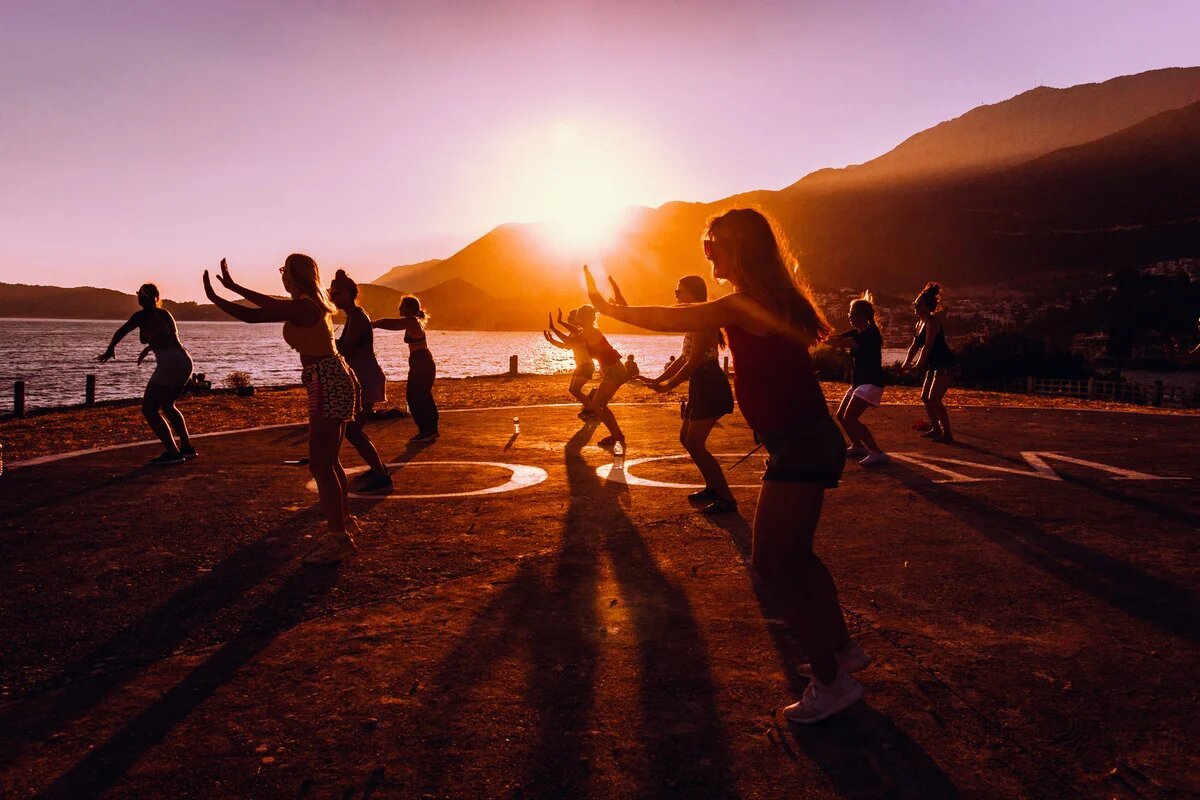
Photo: Nadezhda Kashina
A PR-manager by trade, Alyona first came to Kas in January 2021. She booked a hotel room for two days but then extended her stay by a week. She says that at the time there were 15-20 Russians in town, very few. In a week’s time, she and her newly-found friend rented a double-bedroom apartment for 3,000 liras a month (€170), a great price judging by Moscow’s standards. She ended up staying in Kas until late June.
Alyona’s second winter in Kas began in December 2021. The prices had already started to creep upward. On the one hand, Turkey’s highest inflation in 23 years had its say (according to the Turkish statistics office, by June 2022 it accelerated to 73.5%, while food almost doubled in price in one year). On the other hand, Turkish towns started enjoying popularity among foreigners who could work remotely during the pandemic. Moreover, the war made a big difference as well. Starting from March, Russians started fleeing the country en masse. Turkey is a very convenient option for moving as prices are relatively low here (especially for a person whose income is in strong-performing currencies), it’s safe, easy to obtain a residency permit and so on.
“How many Russians were in Kas in March?” Alyona repeats the question. “Step outside and all you see is Russians. Many people have left now. Some realized that it’s not as cheap as they expected, the rent has gone up by 2-3 times. My landlady is from Germany, it’s very straightforward with her. She is keeping the price exactly as we agreed on it. But there have been cases when people were renting places from locals who after a month suddenly said ‘Sorry, we are doubling the price. If you don’t like it, leave.’ And a new Russian is moving in when the other moves out. When the mass migration of Russians began, people were ready to rent places for 20,000 liras a month (€1,150).
“We, those who stayed there a while, were shocked. ‘People, why are you pushing the prices up? The locals can see it all!’ Then the demand went down a little.”
Alyona’s main job is still PR in Russia but she has already found a potential client here, in Turkey — a company that organizes parties and meet-ups. She almost did not have to do much to get it, just attended one of these parties. “I feel like Kas united the crème de la crème of the society, smart, educated and well-rounded people, both IT specialists and not,” she says. “There are lots of IT people, digital nomads, but also creative people as well. Even in Moscow I don’t have the social life I have here. You can go out one evening and meet so many people.”
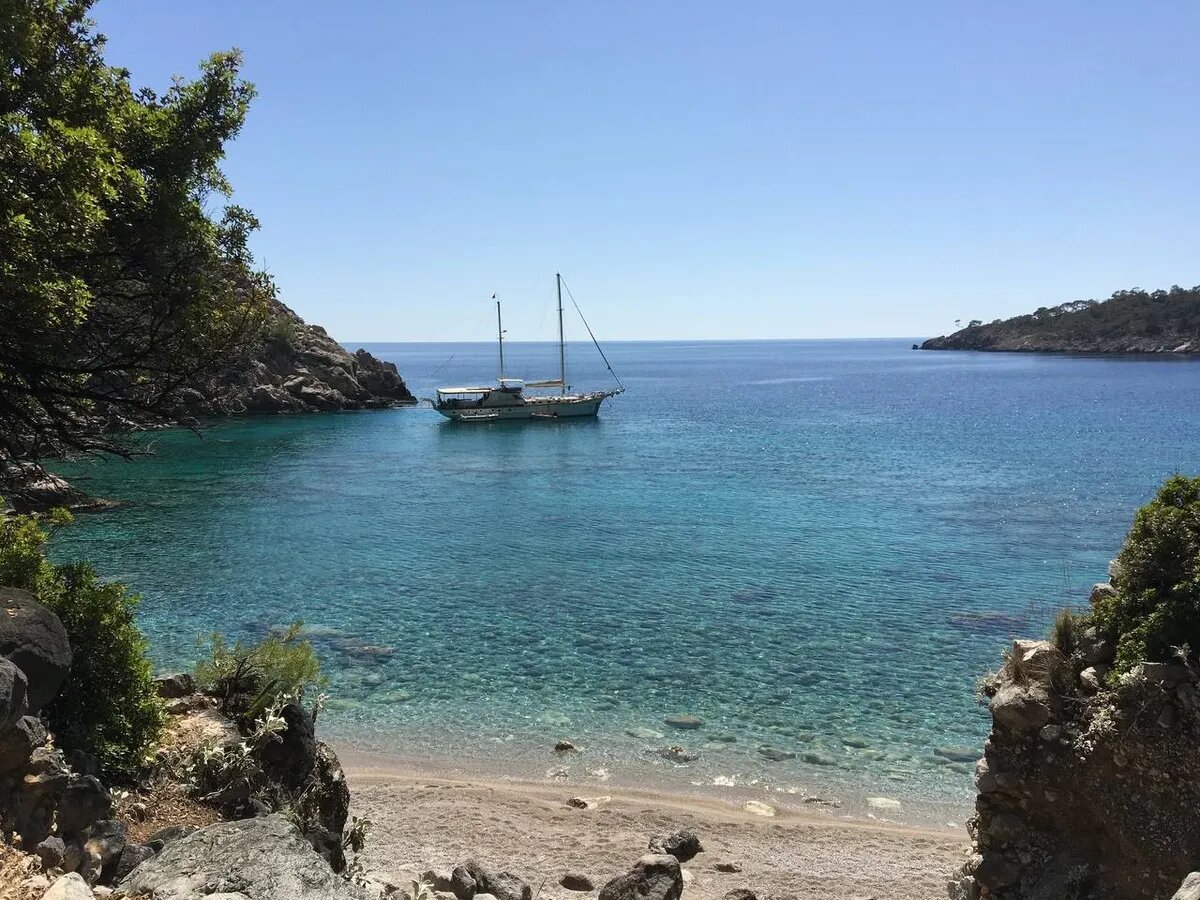
Kas coast. Photo: Nadezhda Kashina
‘No one should go out there killing people’
Samir created a chat called ‘Russians in Kas’ in January 2022. There were 300 members after a month. By the time the war started it had grown to 800 users, while around 100-200 newcomers were joining daily after 24 February, there were a lot of refugees. “It is mostly Russian citizens but there are Ukrainians as well,” Samir says. “Very different people were fleeing, mostly with families. Although I know a few guys of conscription age.”
Kas was not an escape destination for Samir. He is an IT recruiter working remotely, he just wanted to have a nice winter season. Even though he knows firsthand what it’s like to be a refugee. His family are Jehovah's Witnesses. After the denomination was banned in Russia, Samir’s mother and sisters moved to different cities in Europe.
“Our chat has people from all walks of life,” he says. “We were quickly intercepting all provocative messages. I was deleting texts asking to support both Ukrainian and Russians armies. I am strongly neutral towards any hostilities and weapons. No one should take up rifles and go out there killing people. Jehovah's Witnesses, even though I am not one of them, were also strictly neutral during World War II.”
According to Samir, Kas stands out among those towns and cities where everyone can come. “Yes, Antalya, Alanya, Mahmutlar are well-known, transport infrastructure is better there and prices are lower. But Kas is a paradise for the chosen ones. It was promoted by bloggers, media and influencers who were coming here. There’s a special vibe and company here. And our chat is much to thank for it.”
“Every third person I meet says, ‘We came because we liked the community, the chat and all services.’ The audience is not toxic there, people are rational and objective.”
Around a half of the who travelled to Kas are IT specialists, but there are others as well. There are a lot of people who launch online schools, marketing professionals who deliver lectures, nutrition specialists. There are a lot of athletes, those who organize CrossFit, yoga, dance and Pilates classes. Creative people are also here, they teach how to draw, set up exhibitions. Meanwhile, there are constant arguments about the best crypto wallet and how long Bitcoin will continue to drop.
The tiny town is bubbling with life. Russians can get together to do yoga, swim and dance, play football and volleyball, listen to lectures from top literature critics, attend tours with famous guides, take part in quizzes to test who is most knowledgeable in Kas, drive to vineyards and try wines, sail on yachts accompanied by live music. And the list keeps going. Sometimes there are up to 2-3 events per day and it’s difficult to choose just one.
It would be naïve to think that you can just leave everything behind at home and arrive in Kas with a passport to do what you’ve been dreaming of your whole life. You must have financial security to last at least 4-5 months. “However, if a person is looking for ways to earn, they will definitely find it thanks to networking which is the most fundamental thing,” Samir believes. “It is important to focus on one project and work on it.”
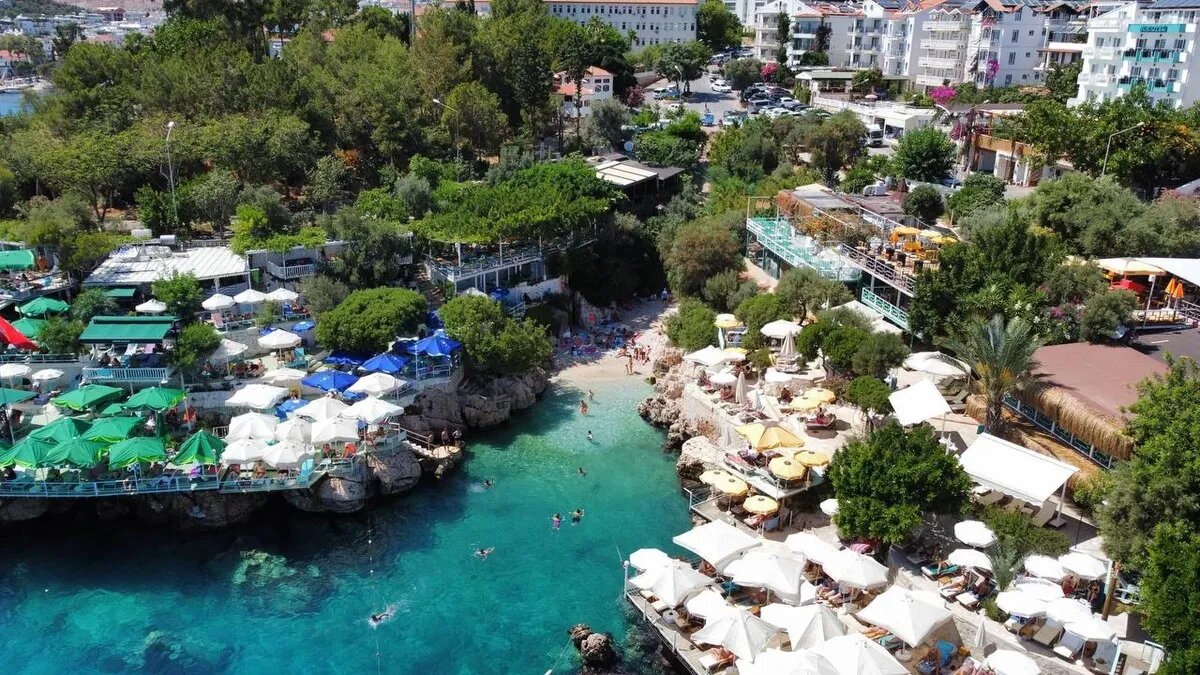
Photo: Telegram russ_kas
It is a rather simple process to obtain a tourist residence permit in Turkey, there are people who can help for 8,000 liras (€ 450 euros). It is enough to have one meeting with a Turkish migration official and get a permit for a year or 6 months. Kas did not make the list of cities and towns where the official share of foreigners had to be restricted. On 1 July 2022, the number of these districts went up from 781 to 1,169. For instance, Antalya now has 10 of those, while there were only 3 just a month ago.
Expensive rent is the main problem of Kas. It is arguably the highest on the Turkish Mediterranean coast. The only competition in prices is neighbouring Kalkan, a favourite place for British nationals.
“Yes, properties are expensive in Kas,” Samir confirms. “However, top villas situated on the peninsula where prices start from $2,500 aside, it is easy to rent an apartment for 15,000-25,000 liras a month (€850-1,430). It is approximately 80,000 rubles, not that expensive for Moscow. You can also share a flat with someone. There are people who leave Kas not because they cannot pay this much but because they just don’t want to out of principle. I agree with them, I am not ready to pay even 15,000 liras for a place to live.”
As for buying properties, there are a few Russians in Kas who did that. The prices are very much in line with Moscow’s: 9-10 million rubles (€152,000-170,000) for a double-bedroom flat in a mountainous part of the town. But you can only drive to the coast from there, walking would be far. Places near the sea can go for 20 or 25 million rubles (€340,000-425,000). Properties doubled in price in the past year.
Many of Samir’s friends have now moved back to Russia or went to north Turkey to wait out the heat. “I wouldn’t call Kas a place where people want to stay,” he stresses. “Or rather everyone probably wants to but not everyone can due to the high rent prices here. People will come here in cycles: people will come here in autumn and leave in the beginning of summer. And this is becoming a permanent fixture.”
‘No nuclear strikes? So be it’
According to Samir, 95% of those residing in Kas are against the current Russian political course but they cannot be described as political refugees, they did not suffer for their dissident views in Russia. Meanwhile, Nadezhda, who used to work as a tour guide in Russia’s Dagestan, help a shelter for women and volunteer for a human rights organization, has a different opinion.
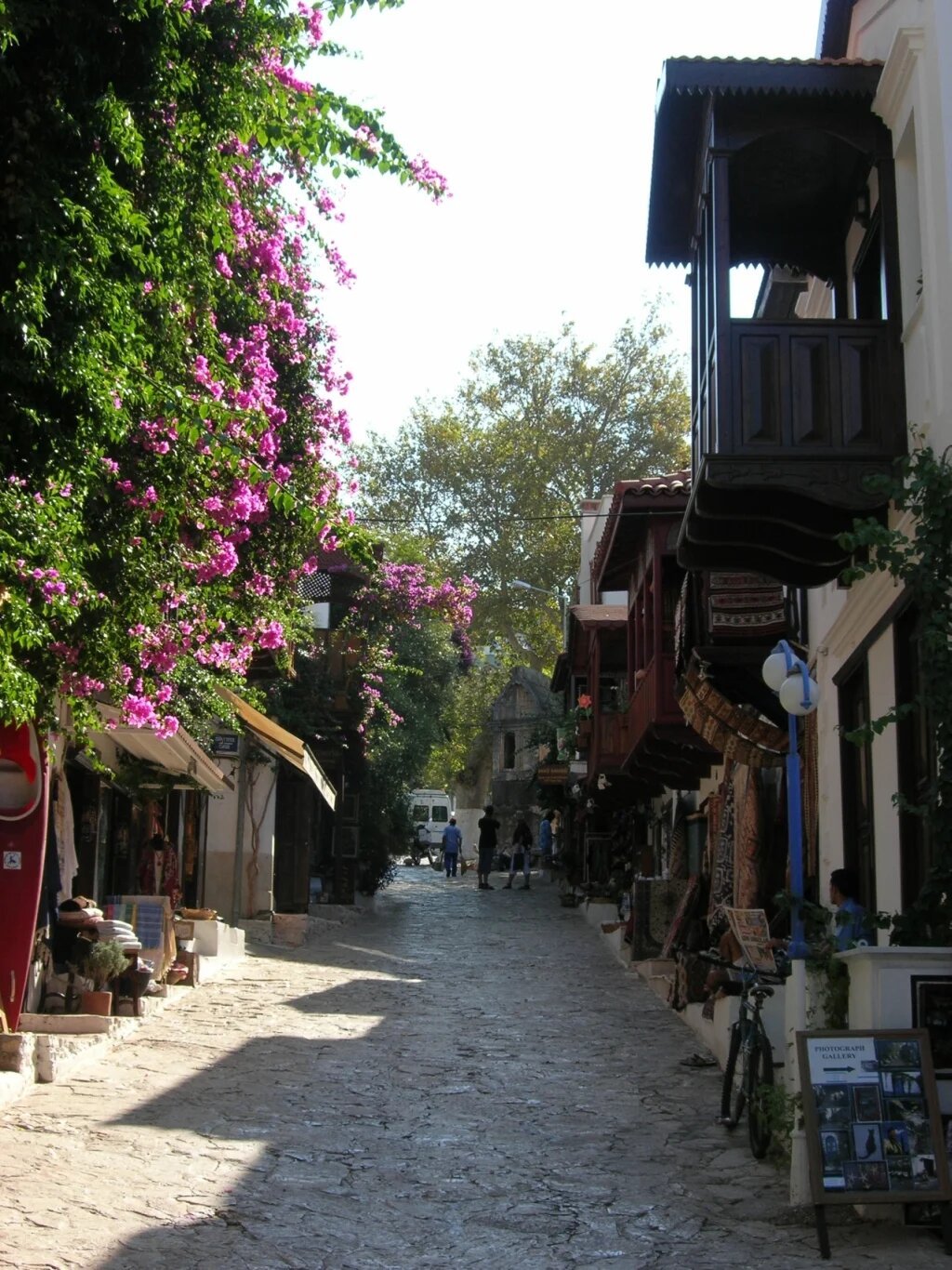
Street in Kas. Photo: Alessandro57
“There are lots of political immigrants here, young and highly adaptive people who oppose the current regime. Although there are also a lot of those who only want everything to be nice, tasty and cheap, they don’t need anything else to be happy. Southern Turkey used to welcome typical average tourists who only wanted to tan. Other Russians are coming now, Turks themselves are saying that. These Russians are not fazed by the fact that all-inclusive service is not very developed in Kas. Kas is a place for independent life.”
Nadezhda earns her living in Turkey as a photographer and also teaches Turkish. Her mother lives in Russia and sometimes has police visits. Officers asks whether she saw her daughter recently. The mother honestly replies that she hasn’t seen her in a while.
“Russians are slowly getting used to war and everything that’s going on. No nuclear strike? So be it,” she says.
“I realized that if I stayed in the country, I would get used to it as well. I’d get used to it to such an extent that I’d be targeted by a police search, and I don’t want to wait until then.”
Our interview is taking place in a cafe that serves (relatively) Russian food. Slavic potato pancakes and traditional beetroot soup Borscht are made by owner Ismail, Turkish Kurd, with the help of employees hired particularly from the post-Soviet states. A Russian resident of Kas taught Ismail how to make kvass, a fermented cereal-based drink, dumplings are supplied by another one. A third one delivers rye bread. As of now, this is the only place that serves Russian food in Kas, which means a potential market niche for business is wide open.
‘I want to live on the planet, not in a country’
“There used to be diasporas, now there are communities,” say newcomers in Kas. Some of them organize traditional guided tours, some are in charge of taxi services jointly with locals or are developing food delivery companies.
Maksim Zaikin creates co-living spaces for people with similar habits and values by subletting villas. Maksim, a mentor for several projects in Moscow and St. Petersburg, creator of Co eco-system, arrived in Kas in November 2020 to pass the winter. He first organized a party in the neighboring town of Kalkan attended by 45 people mostly from Kas. Maksim then realized that it’s better to move there.
“All people that I am talking to here say that it’s a sort of place of power,” he says. “Kas gives you energy and helps you grow. Everyone in my circle can feel it. I was meeting people that I knew through Facebook but never had personal contacts with when Russians were arriving here in big numbers. Now, the trend has reversed — people stayed in Turkey for the officially allowed 90 days and decided to move back home or change the location.”
“We often see people leave, realise what they really want and come back. In the time of war, Kas has become not just an isle of calmness but also a space for development.”
“At their peak, Maksim and his business partner Nikita had 6 villas on the peninsula and apartments in the centre. Prices start from $1,000 per month for a double room outside of the tourist season. When it gets hotter, prices go up as well to at least $1,700. Coworking spaces that host events, lectures and workshops are also available. It has essentially transformed into a home for the community or a culture centre. “It’s very easy for us to find speakers, they themselves come looking because Kas is a place with a lot of fantastic people.”
The team is planning to set up camps with experts on their villas and launch educational programs for kids. Maksim himself has two, 8- and 10-year-olds, they are currently studying online. But the entrepreneur is dreaming of creating an offline program for education.
Many Russians come with kids but the nearest school offering education in Russian is located in Antalya.
“I am not thinking of going back to Russia,” Maksim concludes. “I want to create a lifestyle where I can move between hubs: Kas, Bali, Portugal. We go where there’s a market for it, where Russians go. I want to live on the planet, not in a country.”
Join us in rebuilding Novaya Gazeta Europe
The Russian government has banned independent media. We were forced to leave our country in order to keep doing our job, telling our readers about what is going on Russia, Ukraine and Europe.
We will continue fighting against warfare and dictatorship. We believe that freedom of speech is the most efficient antidote against tyranny. Support us financially to help us fight for peace and freedom.
By clicking the Support button, you agree to the processing of your personal data.
To cancel a regular donation, please write to [email protected]
